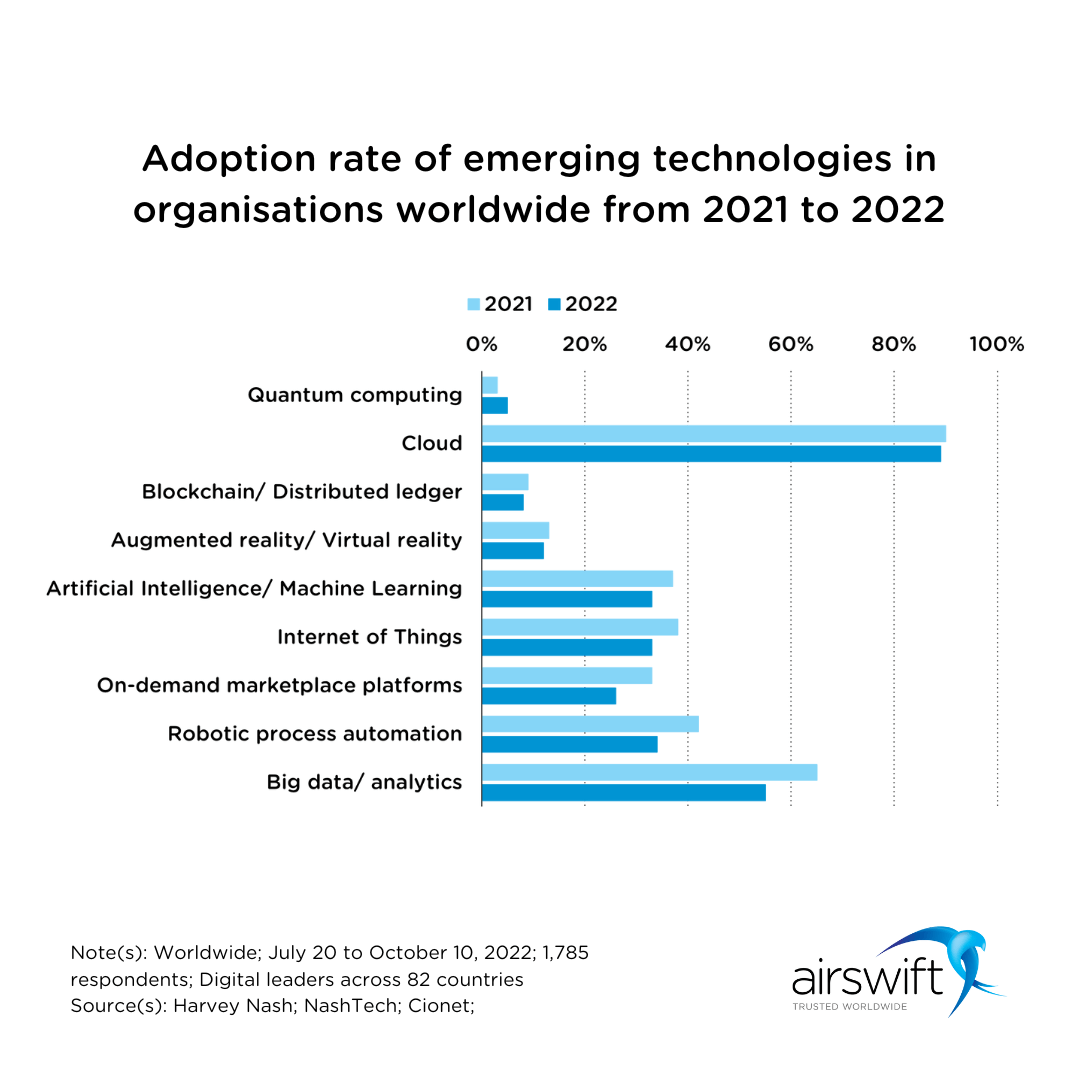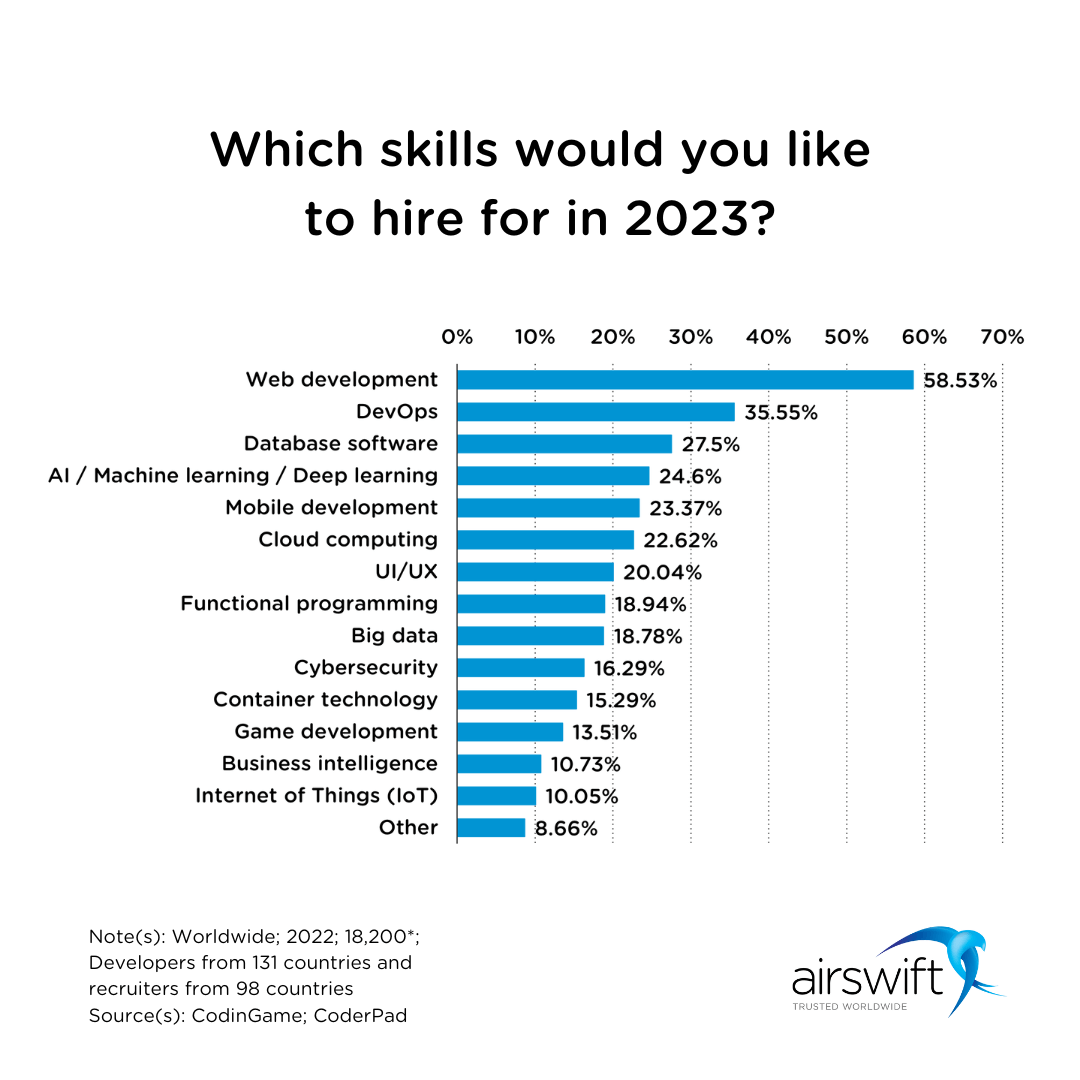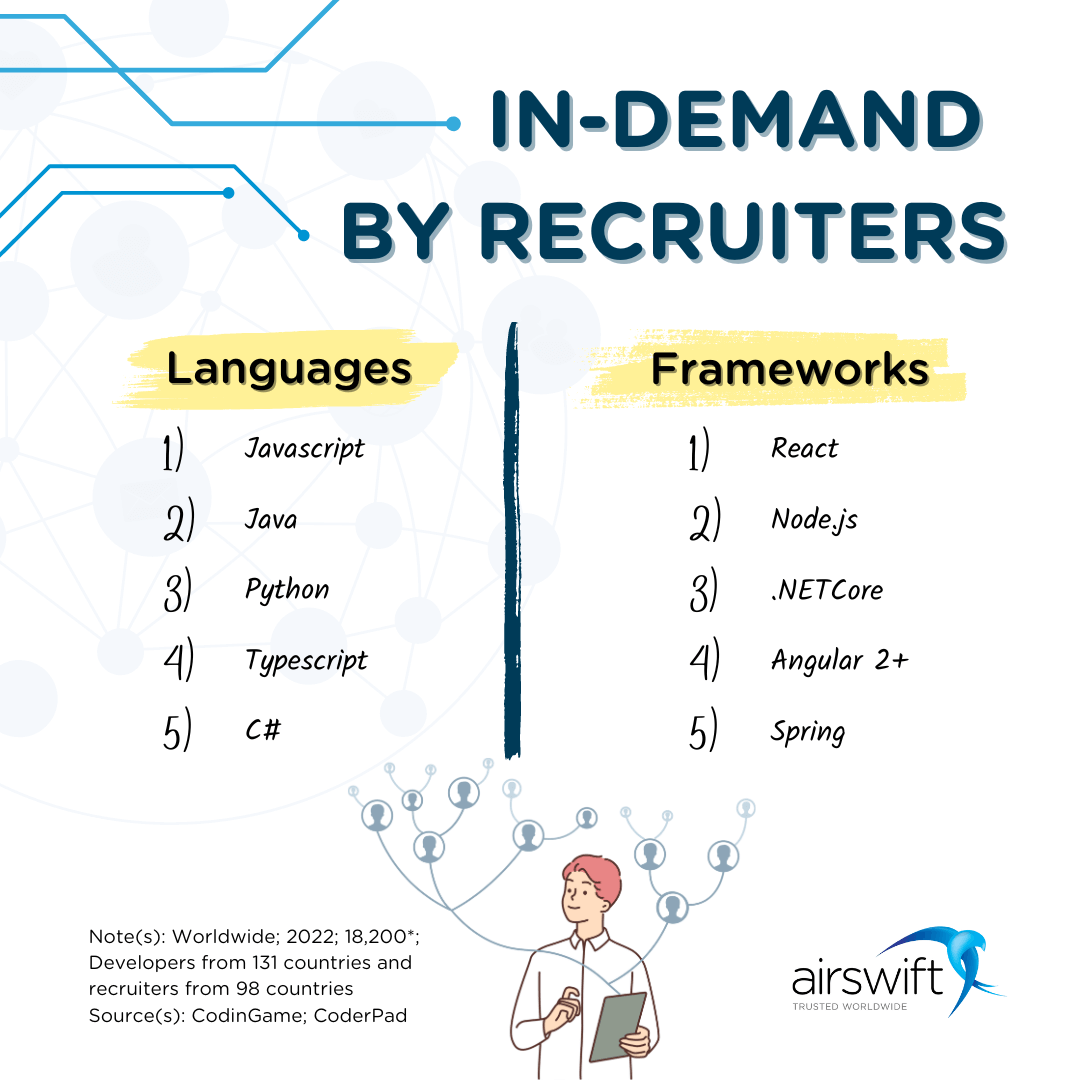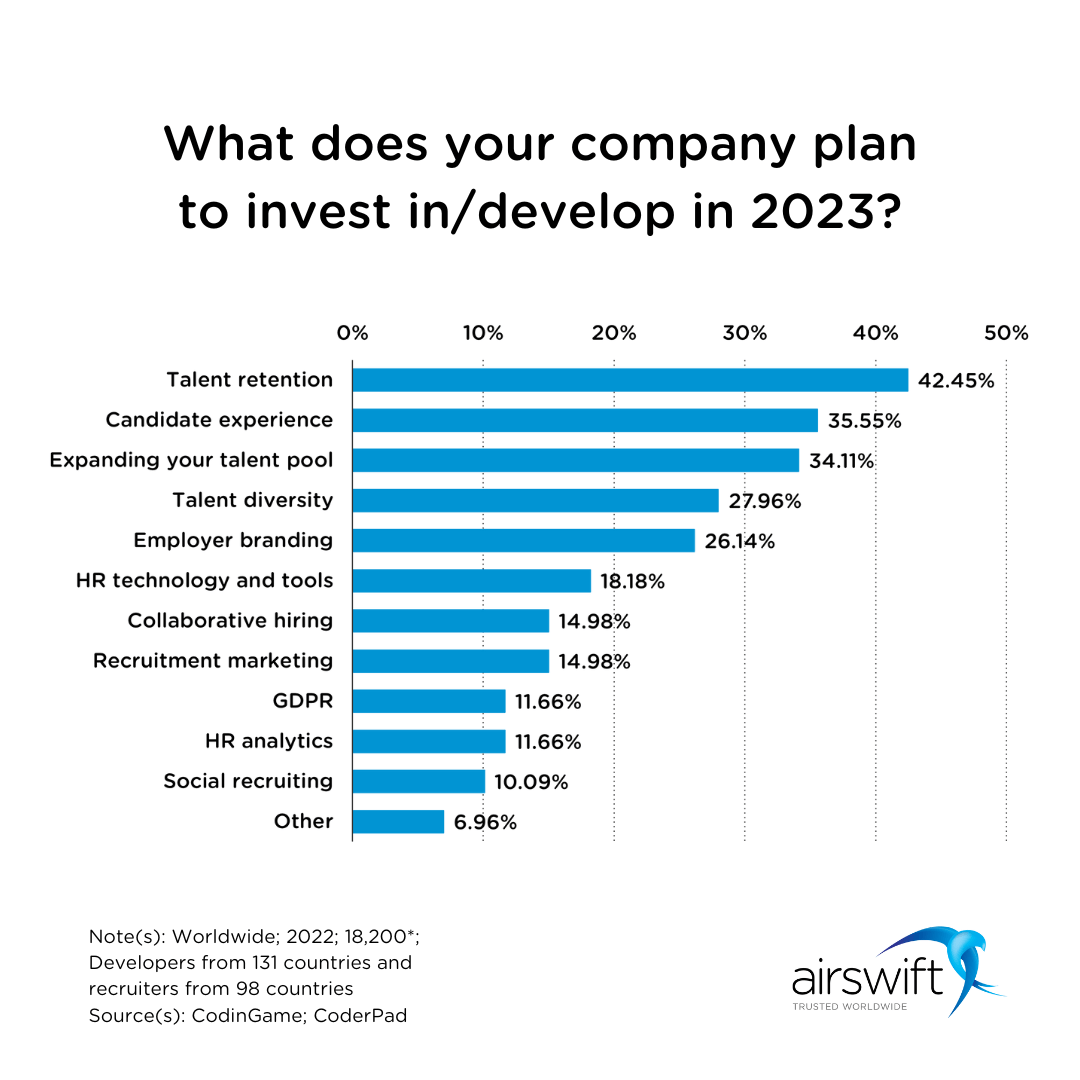
By
Raphael Santos
May 29, 2023
Updated
January 28, 2025
Essential skills and strategies for hiring and job seeking in emerging technologies
As technology advances at breakneck speed, so has the demand for professionals who can keep up with the latest emerging and disruptive technologies.
From human augmentation intelligence to blockchain and the internet of things (IoT), the demand for skilled professionals who can harness technological innovations will only increase in the coming years.
 Source: Frame Stock Footage/Shutterstock
Source: Frame Stock Footage/Shutterstock
But hiring for emerging and disruptive technologies requires a different approach to traditional hiring. To stay ahead of the game, companies must identify the skills and traits that are in high demand and seek out candidates who possess them. As for the candidates, they need to be aware of the top programming languages and frameworks in-demand by recruiters.
So, whether you're a job seeker looking to enter the field or a hiring manager looking to build a winning team, this article will give you the insights you need to succeed.
The markets leading the way
The prevalence of innovative technologies is increasing as they continue to disrupt various industries. Regardless of the sector, it is possible to see a digital transformation occur unanimously, not only in startups anymore but in many traditional sectors that are now boasting an extremely technological profile.
Industries such as finance and banking are leveraging technologies like blockchain and artificial intelligence to enhance security, streamline processes, and enable faster transactions.
With the increasing adoption of cloud computing, companies are prioritising the protection of their data and infrastructure. Cloud security providers, such as Palo Alto Networks, Check Point Software Technologies, and Fortinet, offer robust solutions to safeguard sensitive information from cyber threats and ensure compliance with data protection regulations.
Healthcare is also undergoing a digital revolution with advancements in telemedicine, electronic health records, and AI-driven diagnostics blending seamlessly together to improve patient care and accessibility. Within transportation and logistics, autonomous vehicles, route optimisation algorithms, and real-time tracking are revolutionising the sector boosting efficiency and reducing cost.
The question that remains is which technologies are advancing at a quicker pace in terms of investment, and as a result, will draw in more skilled workers?

According to the chart, Cloud and Big data are industries with high potential for employment opportunities. It also suggests that niches like cybersecurity and data-driven decision-making will play a significant role in the next stages of digital transformation.
As more and more businesses move their applications and workloads to the cloud, the need for cloud workload protection platforms becomes increasingly important. They offer a way to detect and prevent threats such as malware, ransomware, and data breaches in container-based, serverless, and virtualised environments.
These platforms provide codebase hardening, which is the process of making code more secure by removing vulnerabilities and improving security features. By implementing such robust systems, businesses can ensure the security and integrity of their applications and data, and protect against potential cyber-attacks.
In-demand skills for 2023
The State of Tech Hiring 2023 report, released by CodinGame and CoderPad, provided valuable insights into the technology market, including the key skills sought out by companies in their search for talent.

Recruiters are expected to seek out more full-stack developers due to the high demand for web development skills in the market. Additionally, professionals in machine learning and big data will continue to be sought after as demand grows.
Gain back-end and full-stack experience for better job opportunities
Back-end developers work on the server-side of web and software applications, while full-stack developers can work on both front-end and back-end development. By gaining experience in both areas, developers can showcase their versatility and increase their job prospects.
Besides, having a comprehensive understanding of the full development process can help developers create more effective and efficient solutions. Overall, learning back-end and full-stack development can be a valuable investment for a tech career.
In-demand languages and frameworks for 2023
The market demand for coding languages and frameworks is a major topic of discussion, with a focus on which ones will hold a larger share and which ones will be in high demand by 2023. That second prediction is our main subject here:

JavaScript continues to be a mainstay, with the majority of companies in need of developers with experience in the language. Python is also expected to remain popular for its use in big data and machine learning. React, Node.js, and Angular are frameworks that will be highly sought after due to their versatility and scalability.
Feeling behind on the hi-tech job search? Here is how you can charge forward
Build a strong foundation on the skills needed by recruiters
As previously highlighted, focusing on in-demand languages and frameworks is a recommended career path. It is important to acquire a comprehensive grasp of the key languages, frameworks, and principles that serve as the foundation for emerging technologies. This includes areas like data science, machine learning, cloud computing, cybersecurity, and blockchain.
Create personal projects related to the emerging technology you are targeting and develop a portfolio that showcases your abilities. This can help you demonstrate how you have applied your skills to solve practical problems or build innovative solutions.
Embrace continuous learning
The field of emerging technologies is dynamic and rapidly evolving. Be proactive in acquiring new skills and knowledge through online courses, workshops, boot camps, and certifications. Emphasise adaptability and a growth mindset.
Tech-specific platforms: Platforms like Codecademy, DataCamp, and Pluralsight offer specialized courses and learning paths focused on coding, data science, machine learning, and more.
Open-source communities: Participate in open-source projects hosted on platforms like GitHub. Contribute to relevant repositories and engage with the community to enhance your skills and expand your network.
Industry events and conferences: Attend tech conferences, summits, and meetups related to emerging technologies. Examples include TechCrunch Disrupt, Google I/O, or industry-specific events like AWS re:Invent or Microsoft Ignite.
Online communities: Join online forums, discussion boards, and social media groups focused on emerging technologies. Engage in conversations, ask questions, and learn from the experiences of others in the field.
Stay updated: Subscribe to relevant newsletters and follow thought leaders.
Build a strong network and develop your collaboration skills
Collaborate with others and contribute to real-world initiatives. This demonstrates your ability to work in teams and shows your dedication to making meaningful contributions. Look for local hackathons to join and engage in creating practical business solutions, building your portfolio, and networking with tech professionals and mentors.
Utilise platforms like LinkedIn to connect with professionals working in emerging technologies. This way, you can join relevant groups, participate in discussions, and contact experts for guidance and mentorship.
All of these can be incredible opportunities for you to develop soft skills and be more present in your aimed niche.
The rise of freelancing: a trend that demands attention
The rise of freelance work is a trend that cannot be ignored by businesses and developers. With the flexibility and independence that freelancing offers, businesses are able to access a wider pool of talent and developers can work on projects that truly interest them.
Freelancing also offers cost savings for both parties as there is no need to pay for office space or equipment. This trend is set to continue as the benefits of freelancing become increasingly apparent and more businesses seek out a more agile and cost-effective workforce.
Skill-based assessments and coding interviews are surpassing demand for traditional education routes
Traditional computer science degrees are no longer the sole measure of technical talent. To fill the growing demand for open roles, companies should focus on skills-based assessments and coding interviews to gauge a candidate's capabilities.
These methods provide a more accurate assessment of a candidate's skills, knowledge, and ability to problem-solve in real-world scenarios. Employers can then hire professionals who can bring fresh perspectives and innovative solutions to the table, regardless of their educational background.
Therefore, it is crucial for companies to adapt their hiring practices and prioritise skills over degrees to stay competitive in today's fast-paced technological landscape.
In our recent whitepaper on the tech talent workforce needed in today's green industry, we emphasised the importance of exploring bootcamps and other learning accelerator programs to find the right match for your tech team.
Your business needs to cultivate a tech-forward employer brand
To stand out from the crowd, companies need to establish themselves as desirable employers by cultivating a positive employer brand.
This involves creating a compelling narrative that highlights the company's values, mission, and commitment to innovation. By showcasing exciting projects and cutting-edge technologies, companies can demonstrate their position at the forefront of industry advancements, captivating the attention of tech enthusiasts and professionals eager to work on groundbreaking initiatives.
%20(1).png?width=1280&height=1810&name=How%20to%20Build%20an%20Employer%20Brand%20(1)%20(1).png)
Sharing your achievements not only enhances the company's reputation but also creates an environment that appeals to talented individuals seeking meaningful work and career growth.
Also, sharing the stories of your own tech professionals may enhance identification and mimicry among other tech talent, potentially increasing their interest in joining your company.
Furthermore, emphasising the company's dedication to continuous learning, professional development, and a supportive work culture reinforces its commitment to nurturing talent and encourages tech professionals to join the organisation.
In the race for tech talent, building a strong employer brand and showcasing exciting projects are powerful tools that attract and retain top-tier professionals, enabling companies to thrive in the fast-paced world of emerging and disruptive technologies.
Many developers want to change jobs because of salary
The demand for skilled technical professionals remains high in today's job market, making the competition for hiring these individuals increasingly intense. According to the same report already mentioned in this article, more than 50% of developers are considering changing jobs, with salary being one of the primary motivators.
Employers must keep up with competitive salary offers and provide additional incentives to retain their top technical talent.
In one of our recent articles, we highlighted how academic studies — focused on R&D, the basis for hi-tech development — showed that young workers, millennials especially, could be attracted by these six incentives: salary and benefits, flexible work arrangements, purposeful work, professional development opportunities and organisational ethos.
To ensure the attraction and retention of talented employees, it is important to analyze and adjust those incentives to address any issues that may arise.
Talent retention still is your best strategy
Talent retention is important for the success of any organisation. It involves creating a workplace culture that encourages employee engagement, job satisfaction, and loyalty.
Retaining talented employees can save time and money that would otherwise be spent on hiring and training new ones. No wonder, It has been ranked as the top choice for companies' investment plans in recruitment procedures for 2023.

Moreover, happy employees tend to be more productive and committed to the company's goals, resulting in improved performance and increased profitability. Therefore, a well-planned talent retention strategy should be a top priority for any organisation looking to achieve long-term success.
It’s time to forge partnerships that can help you attract and retain talent
Partnering with an experienced team of professionals can be the key to attracting and retaining top talent. At Airswift, we understand the importance of a strong talent acquisition strategy, and our team is dedicated to helping your business find the right people for the job.
We have experience in sourcing and recruiting highly qualified professionals worldwide who are skilled in emerging and disruptive technologies. With more than 60 offices globally and over 9,000 contractors, we have the expertise and resources to connect companies with the perfect match. the right people.
Our tech recruiters squad have the in-depth knowledge to focus on skills-based assessments and coding interviews to evaluate a candidate's capabilities accurately. Don't let your gut call the shots when it comes to hiring. With us, you will listen to the data, trends, and consumer behaviour to make the right decision.
With more than 60 offices worldwide and over 9,000 contractors, we provide a comprehensive suite of workforce solutions to help you with tech talent retention while also expanding businesses to new and exciting markets.



